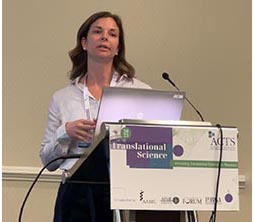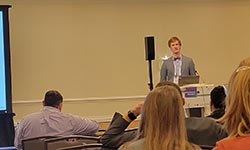In a translational science training sweep, all three of the Institute for Translational Sciences TL1 trainees who submitted poster abstracts were selected to be in the Top 50 posters at the 2023 Association for Clinical and Translational Science (ACTS) annual meeting. This honor included the opportunity
to give a platform presentation at the meeting held in Washington D.C. on April 18-20, 2023.
The awardees included postdoctoral fellow Dr. Kristen McGovern (Internal Medicine-Endocrinology), doctoral student Mariel Miller (Graduate School of Biomedical Sciences) and MD-PhD student Timothy Wanninger (Graduate School of Biomedical Sciences). The Top 50 posters were selected among all posters at the conference, including posters by faculty and staff, by the Translational Science Committee of ACTS. Each Top 50 poster by a TL1 trainee also received a Gold Ribbon award.
McGovern’s research advances our understanding of an unexpected connection  between gut and brain health in individuals with traumatic brain injury (TBI). In addition to experiencing fatigue and altered mental states, some people with TBI have changes in the composition of their gut microbiome—the
community of bacteria and other microbes that live in our digestive tracts. Mice that were given microbiomes similar to those of patients with TBI not only developed fatigue, but also had reduced levels of an amino acid critical for the production
of a neurotransmitter that supports wakefulness and cognition. These findings uncover a new avenue of research that has the potential to lead to new treatments for patients with TBI.
between gut and brain health in individuals with traumatic brain injury (TBI). In addition to experiencing fatigue and altered mental states, some people with TBI have changes in the composition of their gut microbiome—the
community of bacteria and other microbes that live in our digestive tracts. Mice that were given microbiomes similar to those of patients with TBI not only developed fatigue, but also had reduced levels of an amino acid critical for the production
of a neurotransmitter that supports wakefulness and cognition. These findings uncover a new avenue of research that has the potential to lead to new treatments for patients with TBI.
McGovern's poster received the Top Presenter Award in the TL1 Poster competition. McGovern was one of only 12 among 212 TL1 Scholars to receive a perfect score at the meeting.
Miller’s presentation describes plans to evaluate different clinical tests  for detecting clotting in people with polycystic ovary syndrome (PCOS). People with PCOS have much greater risk of having a life-threatening blood clot that blocks a blood vessel or heart but the standard methods for diagnosing
blood clot risks don’t work for some PCOS patients. Miller’s research plan will test different methods of measuring clotting risk and may reveal new details about the cellular changes that lead to clotting risk in individuals with PCOS.
Finally, her work could one day help clinicians identify which PCOS patients are at risk for blood clotting. Miller also received a Burroughs Wellcome Fund Award to travel to the meeting in D.C.
for detecting clotting in people with polycystic ovary syndrome (PCOS). People with PCOS have much greater risk of having a life-threatening blood clot that blocks a blood vessel or heart but the standard methods for diagnosing
blood clot risks don’t work for some PCOS patients. Miller’s research plan will test different methods of measuring clotting risk and may reveal new details about the cellular changes that lead to clotting risk in individuals with PCOS.
Finally, her work could one day help clinicians identify which PCOS patients are at risk for blood clotting. Miller also received a Burroughs Wellcome Fund Award to travel to the meeting in D.C.
Wanninger’s research explored the molecular details of the liver inflammation that  arises in Ebola virus disease. Ebola virus infection can have widespread effects throughout the body, including internal bleeding,
inflammation, and injury to the liver and other organs. Wanninger compared livers from Ebola virus-infected monkeys to livers from healthy monkeys, and identified abnormal amounts of several different molecules in the infected livers. Some of these
molecules were involved in immune cell activity and could potentially be treated with medicines that affect immune system activity. His work could lead to new drugs that would expand a clinician’s toolbox for treating patients with Ebola virus
disease. For more information, check out Wanninger’s recent
review on the topic. Wanninger also received
a Burroughs Wellcome Fund Award to travel to the meeting in D.C.
arises in Ebola virus disease. Ebola virus infection can have widespread effects throughout the body, including internal bleeding,
inflammation, and injury to the liver and other organs. Wanninger compared livers from Ebola virus-infected monkeys to livers from healthy monkeys, and identified abnormal amounts of several different molecules in the infected livers. Some of these
molecules were involved in immune cell activity and could potentially be treated with medicines that affect immune system activity. His work could lead to new drugs that would expand a clinician’s toolbox for treating patients with Ebola virus
disease. For more information, check out Wanninger’s recent
review on the topic. Wanninger also received
a Burroughs Wellcome Fund Award to travel to the meeting in D.C.
The Institute for Translational Sciences TL1 program accepts postdoctoral and pre-doctoral researchers interested in developing team-based, multidisciplinary research skills to support the translation of discoveries in the laboratory, clinic, and community
into interventions that improve health and wellness. More information can be found on the ITS website.